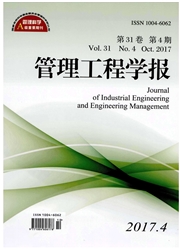

 中文摘要:
中文摘要:
本文基于国有企业的高管变更视角分析了高管权力对公司治理效率的影响。以2004-2008年的国有上市公司为研究样本,实证发现:(1)总体上高管变更与公司业绩呈负相关,而高管权力的增强会降低其因业绩低劣而被强制性更换的可能性,表明国企高管的权力在高管变更决策中发挥了显著的职位堑壕效应;(2)发生了高管变更的公司其未来业绩有明显的提高,但这一促进效应仅在权力较小的高管被变更后出现,而权力较大的高管被变更后公司业绩并没有得到改进;(3)进一步的研究显示,政府控制层级的提升和制度环境的改善能够抑制国企高管的权力寻租行为。本文的研究结果有助于我们理解国有企业高管权力的经济后果,并为当前有关国企公司治理和高管选聘体制改革的政策导向提供了经验启示。
 英文摘要:
英文摘要:
China is a transitional economy and reforming state-owned enterprises. The purpose of this paper is to analyze the impact of chief executives' power on the efficiency of corporate governance from the perspective of chief executive turnover in state-owned enterprises. In our study, we use two categories of composite indicators as the chief executive's proxy indicators for power features and use return on total assets. Operating return on total assets and profit loss status are a company's proxy indicators for operating performance. Based on 4, 121 samples of state-owned companies publicly listed from 2004 to 2008, we find that: (1) Firstly, the logistic regression model shows that a chief executive's position turnover is negatively correlated with a stateowned company's return on total assets and operating return on total assets even though the turnover rate is positively correlated withcompany's loss status on the whole. Meanwhile, the enhanced executive power can reduce the possibility of being forcibly replaced due to the poor performance, indicating that the power of a state-owned company's chief executives play a significant entrenchment role in process of deciding on executive turnover. (2) Secondly, when we use return on total assets and operating return on total assets as the company's proxy indicators for operating performance, a chief executive's turnover can remarkably improve a state-owned company's future operating performance. However, the increased performance only appears after the turnover of chief executives owning smaller power. In comparison, the improvement effect has not been seen in the state-owned company's performance after the position turnover of chief executive holding larger power. (3) Finally, upgrading the state-owned company's administrative level and improving the institutional environment of the company's location can effectively strengthen the mechanism of compulsory replacing chief executives with inferior operating performance. The
 同期刊论文项目
同期刊论文项目
 同项目期刊论文
同项目期刊论文
 Financial relationships, banking structure and financing constraints: evidence from private enterpri
Financial relationships, banking structure and financing constraints: evidence from private enterpri 期刊信息
期刊信息
